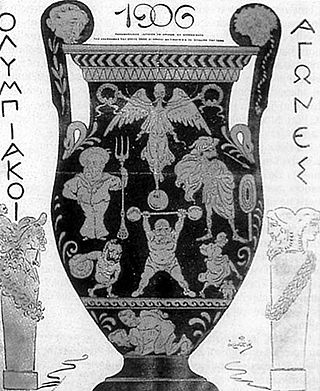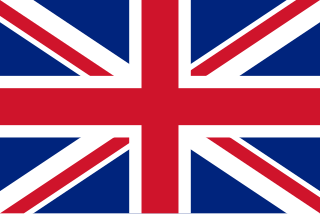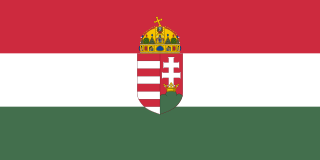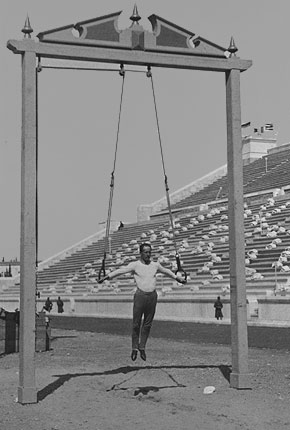
The 1896 Summer Olympics, officially known as the Games of the I Olympiad and commonly known as Athens 1896, were the first international Olympic Games held in modern history. Organised by the International Olympic Committee (IOC), which had been created by French aristocrat Pierre de Coubertin, the event was held in Athens, Greece, from 6 to 15 April 1896.

At the 1896 Summer Olympics, one wrestling event was contested. It was organized and prepared by the Sub-Committee for Wrestling and Gymnastics. Five competitors from four nations competed.

At the 1896 Summer Olympics, two weightlifting events were contested. The top two places were won by the same two men in each event, though their order was reversed for the two events. The bronze medals were split by the two Greek weightlifters. A total of seven men from five nations competed.

At the 1896 Summer Olympics, two tennis events were contested, both for men. They began on 9 April and continued on 8 April, 10 April, and 11 April. 13 or 15 competitors from six nations, including seven Greeks, took part in the tennis competition. Many of the doubles teams were of mixed nationality, including all three medalist pairs. None of the leading players of the time such as Wimbledon champion Harold Mahony, U.S champion Robert Wrenn, William Larned or Wilfred Baddeley participated. To strengthen the field, the organization added sportsmen from other Olympic events, including weightlifter Momčilo Tapavica, hammer thrower George S. Robertson and 800-metres runners Edwin Flack and Friedrich Traun.
At the 1896 Summer Olympics, four swimming events were contested, all for men. They were planned and organized by the Sub-Committee for Nautical Sports. All events took place on 11 April in the Bay of Zea. There was a total of 13 participants from 4 countries competing.

At the 1896 Summer Olympics, eight gymnastics events, all for men, were contested in Panathinaiko Stadium. They were organized and prepared by the Sub-Committee for Wrestling and Gymnastics. Events took place on April 9, April 10, and April 11, 1896. There were 71 competitors from 9 nations that took part in gymnastics.

At the 1896 Summer Olympics, three fencing events were contested at the Zappeion. They were prepared and organized by the Sub-Committee for Fencing. The épée event for men was cancelled. All fencing was done to three touches. Events were held on 7 April and 9 April 1896. 15 athletes from four nations competed; 8 fencers from 3 nations won one medal each.

At the 1896 Summer Olympics, six cycling events were contested at the Neo Phaliron Velodrome. They were organized and prepared by the Sub-Committee for Cycling. Events were held on 8 April, 11 April, 12 April and 13 April 1896. Nineteen cyclists, all men, from five nations competed.

At the 1896 Summer Olympics, the first modern Olympiad, twelve athletics events were contested. A total of 25 medals were awarded. The medals were later denoted as 37 modern medals. All of the events except the marathon were held in the Panathinaiko Stadium, which was also the finish for the marathon. Events were held on 6 April, 7 April, 9 April, and 10 April 1896. Altogether, 63 athletes, all men, from nine nations competed. This made athletics the most international of the nine sports at the 1896 Games.

The 1906 Intercalated Games or 1906 Olympic Games, held from 22 April 1906 to 2 May 1906, was an international multi-sport event that was celebrated in Athens, Greece. They were at the time considered to be Olympic Games and were referred to as the "Second International Olympic Games in Athens" by the International Olympic Committee (IOC). However, the medals that were distributed to the participants during these games were later not officially recognised by the IOC and are not displayed with the collection of Olympic medals at the Olympic Museum in Lausanne, Switzerland.

Australia competed at the 1896 Summer Olympics in Athens, Greece, from 6 to 15 April 1896. One athlete from Victoria, a British colony which later formed part of Australia, competed at the 1896 Summer Olympics in Athens, Greece. Edwin Flack was born in the United Kingdom and was resident in London in 1896, but spent most of his life in Australia and so is considered an Australian athlete by the International Olympic Committee.

Three athletes from Denmark competed in five sports at the 1896 Summer Olympics in Athens. Two of the three combined to win a gold medal, two silvers, and three bronzes, while Eugen Schmidt earned no medals. Viggo Jensen contributed one of each color, while Holger Nielsen earned the second silver and two bronzes. Shooting and weightlifting were Denmark's most successful sports. Denmark had 15 entries in 12 events, winning six medals.

France competed at the 1896 Summer Olympics in Athens, Greece, from 6 to 15 April 1896. French athletes had appeared in every Summer Olympic Games of the modern era, alongside Australia, Great Britain, and Greece. France won the fourth-most gold medals with 5 and the fourth-most total medals with 11. Cycling was the sport in which the French competitors had the most success, as they completely dominated the field. The French team had 27 entries in 18 events, winning 11 medals.

Ten athletes from the United Kingdom of Great Britain and Ireland competed in seven sports at the 1896 Summer Olympics. The Great Britain athletes were the fifth most successful in terms of overall medals (7) and tied for fifth in gold medals (2). The 7 medals came on 23 entries in 14 events.

Greece was the host nation of the 1896 Summer Olympics held in Athens. The number of Greek contestants is commonly cited as 169, but as many as 176 Greeks contested events in all nine sports. The Greeks were by far the most successful nation in terms of total medals with 47, 27 more than the United States of America. Nevertheless, their number of first-place finishes (10) was one fewer than the Americans' 11. The Greeks had 172 entries in 39 events. Only 4 events had no Greek entrants—the 400 metres and the high jump in athletics and the vault and the team horizontal bar in gymnastics.

Hungary competed at the 1896 Summer Olympics in Athens, Greece. Austrian and Hungarian results at early Olympic Games are generally kept separate despite the union of the two nations as Austria-Hungary at the time.

Fourteen competitors from the United States competed in three sports at the 1896 Summer Olympics in Athens, Greece. The Americans were the most successful athletes in terms of gold medals, beating host nation Greece, 11 to 10, despite fielding only 14 competitors compared to an estimated 169 Greek entrants. However, the Greeks' 46 total medals dwarfed the Americans' 20.

Greece has competed at every Summer Olympic Games, one of five countries to have done so, and most of the Winter Olympic Games. Greece has hosted the modern Olympic Games twice, both in Athens for the Summer Olympic Games, in 1896 and 2004.

The men's rings was one of eight gymnastics events on the Gymnastics at the 1896 Summer Olympics programme. The fifth event, it was held on 9 April. There were eight competitors from three nations. The Greeks won the gold and bronze medals, with Hermann Weingärtner winning his fifth medal. Places 1–3 and 5 are known, but 4th place is not—any of the four athletes whose places are not known may have occupied the fourth position.

Greece competed at the 1912 Summer Olympics in Stockholm, Sweden. 22 competitors, all men, took part in 25 events in five sports. Greek athletes have competed in all Summer Olympic Games.



















